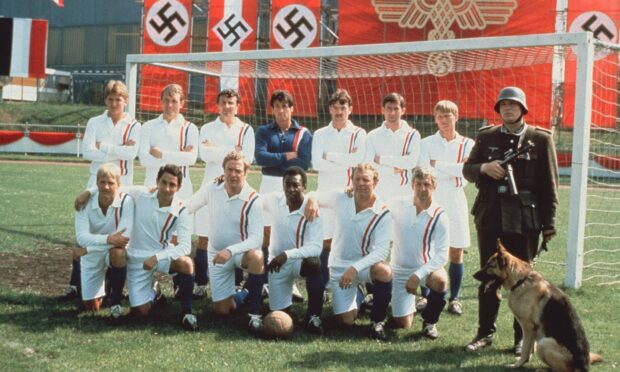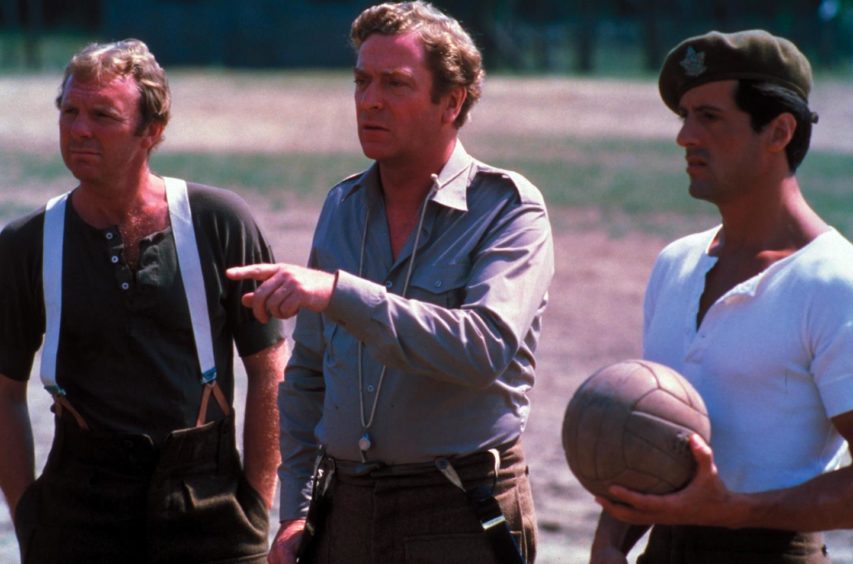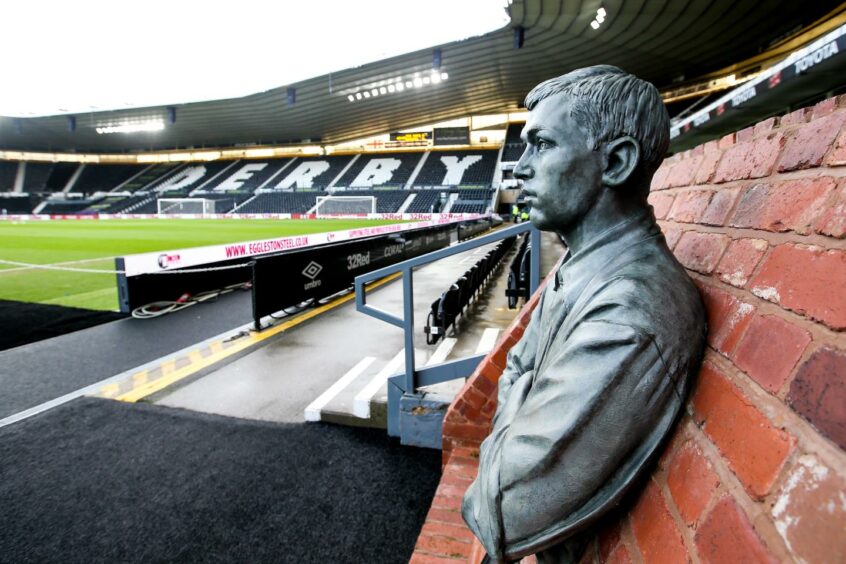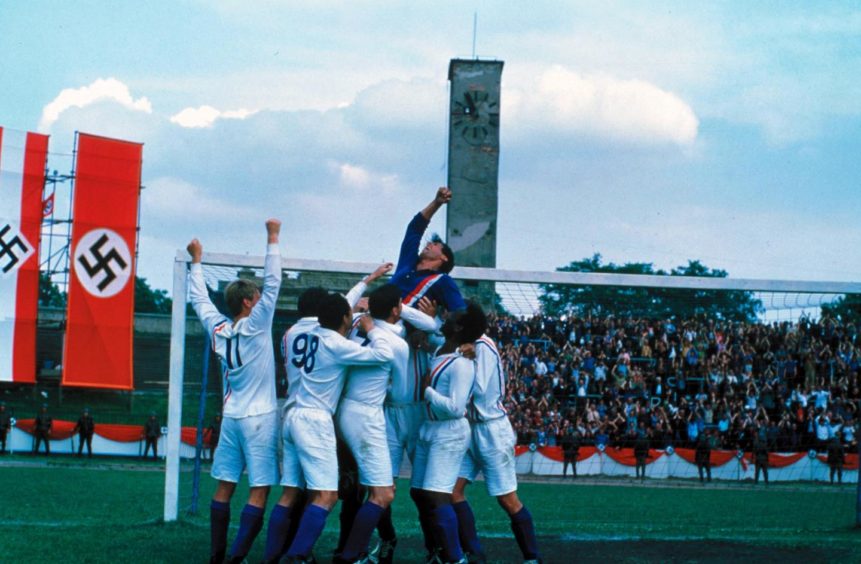It’s the only film ever made to feature Pele, Michael Caine, Sylvester Stallone – and Bobby Moore and John Wark – among the cast.
And most people, at some time or another, will have witnessed the efforts of these renowned Hollywood actors and international footballers to break out of a Nazi prison camp in John Huston’s fabled movie, Escape To Victory.
But while some elements of the script may have seemed pretty far-fetched to audiences when it was originally released in the early 1980s, the storyline isn’t as implausible as you might imagine.
Because, at the start of the First World War, a group of leading players, including men from Dundee and Aberdeen, found themselves incarcerated in a German POW camp – where they spent the next four years.
Or at least, they did apart from two in their ranks – who escaped to freedom and managed to get out of the country and resume their playing careers.
Escape To Victory a true story?
Author Paul Brown has investigated the story of how a group of Britain’s best footballers were interned in a brutal prison camp at Ruhleben, near Berlin.
Among them were the influential Scottish international John “Jack” Cameron and England superstar Steve Bloomer.
Surrounded by barbed wire and armed guards, living in squalor, frequently frozen conditions and on meagre rations, and with their families and freedom far out of reach, Cameron and the others played football as a means of keeping their spirits up in the most depressing of circumstances.
Indeed, they went so far as to establish The Ruhleben Football Association and derived hope and comradeship in the midst of a desperate situation.
But, as Mr Brown has discovered, their lives were as far removed from the bling-and-champers, mansion-and-money-to-burn lifestyle of today’s elite footballers as it would be possible to imagine.
The conditions at the Ruhleben prison camp – a former horse racing track – were appalling, with around 4,500 men packed into 11 filthy stables.
The conditions the prisoners endured were spartan and inhospitable.
The nights were freezing cold, to the point where the inside walls and ceilings were frequently covered with ice and the men’s breath could be seen in the chill.
Sanitary arrangements were completely inadequate.
The men had to queue to wash in cold water which came from one tap and the latrines which had been dug for the prisoners were described later by the American ambassador as “a danger not only to the camp, but to Berlin”, such was the threat of infection.
The first winter was ghastly
The months between November 1914 and February 1915 were very cold, with bitter winds surging in from Poland and Russia, and the rain quickly turned the sandy soil of Ruhleben into a quagmire.
Men found themselves ankle-deep in mud whenever they walked three times a day to queue for rations.
This might have been more tolerable if the captives had received adequate food. But it was in very short supply and some of the men wrote home to their loved ones in Scotland and England to communicate that what little they received was almost inedible.
There was nothing to celebrate during that grim first Christmas in Ruhleben, where the prisoners were left to wonder how they had landed in such a mess.
Myself and many others would not have survived without football.”
Steve Bloomer of Derby County and England
The men desperately needed something to occupy their minds, keep them active and keep them warm.
And that something was football.
Recognising the need to use their own initiative, Cameron, Bloomer and the other footballers – including England internationals Fred Pentland and Sam Wolstenholme and Moffat-born Everton star Wattie Campbell – bartered for balls, marked out pitches, and formed the Ruhleben Football Association.
These redoubtable lads were determined to create something new and organised league and cup competitions involving hundreds of players, which were watched by thousands of spectators, just as happened in Huston’s film.
They also arranged international matches, with Cameron, a little coiled spring of ceaseless energy, captaining the Scotland side.
The game had a hugely positive impact on the morale and well-being of the prisoners.
As England and Derby County legend Steve Bloomer said: “Myself and many others would not have survived without football.”
Cameron was a Scottish international forward, born in Ayr in 1872, who played for Queen’s Park, Everton and Tottenham Hotspur.
He was 42 by the outbreak of the First World War but, to him, age was just a number.
He made 111 appearances and scored 43 goals for Tottenham between 1898 and 1907.
For most of that period, Cameron was both player and manager, and he led Spurs to their notable FA Cup Final triumph in 1901, scoring the first goal in the 3-1 replay victory over Sheffield United.
Cameron and the other professional footballers had been coaching in Germany in 1914 when the conflict broke out and British nationals of fighting age were immediately rounded up and interned by their new enemies.
Eventually, the guards and the officers could be seen watching the football matches and cheering on the prisoners!”
Paul Brown
There were eight professional footballers in the camp, in addition to 25 semi-professionals and prominent amateurs.
Overall, it was estimated that 250 prisoners played football in Ruhleben, and more than 2,500 watched the often-exuberant contests with Cameron a pivotal figure in the various activities of the RFA, for whom he acted as its secretary.
Mr Brown said: “As well as football, the prisoners played cricket, tennis and even golf.
“They arranged concerts, they performed theatre plays, and published their own camp magazine.
“They repaired and rebuilt their barracks, sourced better food, and basically took over the running of the camp from the incompetent German officers.
“Eventually, the guards and the officers could be seen watching the football matches and cheering on the prisoners!”
There were several Dundonians in the prison camp, including a number of keen sportsmen, who were both delighted and relieved when they were offered the opportunity to sign up to the newly formed RFA.
These included Fred Miller, Joseph Petrie and a young student named Gordon Nicoll, who played in goal for Jack Cameron’s Scottish international team and was regarded as “the camp’s crack goalkeeper” by Bloomer.
The Aberdeen men who joined the football ranks in Ruhleben included William Aggasild, Andrew Guyan, Alfred Hill, Dan Williamson, and Alexander Davidson Garden, the latter of whom was arrested while holidaying in Germany and subsequently paraded his talents for Cameron’s Scotland XI.
It was amazing to see how the prisoners turned to football when they were in such dire circumstances.”
Paul Brown
Most of the prisoners spent four long years in Ruhleben, but two of them escaped and they did it by using football as a distraction.
One afternoon Geoffrey Pyke and Edward Falk slipped away from the games and hid patiently in a shed that was used to store the football equipment.
After dark, when all of the other prisoners had returned to the barracks and the guards had failed to notice their absence, the defiant duo climbed the barbed wire fences and crawled for miles on their bellies, as the prelude to riding on trains to the Dutch border and finally gaining their freedom.
They were ingenious in their methods and their quick wits paid dividends.
What happened at the end of the war?
However, the vast majority of the prisoners did not escape and were not released by their captors until the end of the war in the second half of 1918.
Many of the footballers were too old to contemplate resuming their playing careers, even if they had wanted to.
After he returned from Ruhleben, Jack Cameron, now 46, went on to manage Ayr United and became a referee, while other Scots joined local clubs in different capacities.
They were very thankful to be back home, especially when they heard about the slaughter of so many of their compatriots in the trenches.
But, in many cases, the prime years of their careers had been snatched away.
The formation of the RFA makes for a compelling story, littered with absorbing characters, and it’s difficult not to envisage a few screenwriters eagerly scanning Mr Brown’s book in the weeks and months ahead.
He said: “I have wanted to tell this story for a long time.
“I am fascinated by the football stars of this period (the early 20th Century), and I love the movie Escape to Victory, so this was the ideal subject for me.
“It was amazing to see how the prisoners turned to football when they were in such dire circumstances.
“It shows just how important football can be.”
- The Ruhleben Football Association: How Steve Bloomer’s Footballers Survived A First World War Prison Camp is available from Amazon. Visit stuffbypaulbrown.com for more details.



